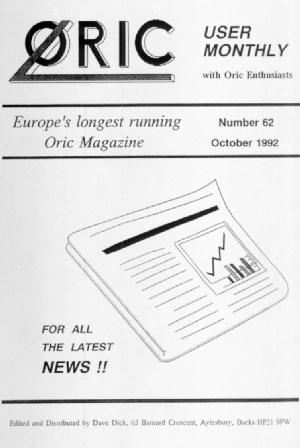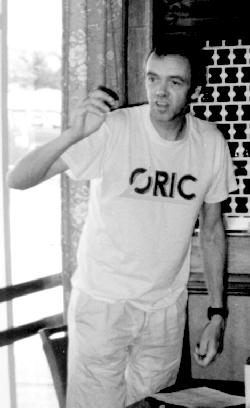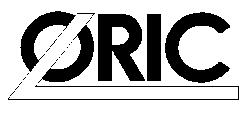Chapter 12
Dream a little dream...


Meanwhile in England Allan Whitaker took over F.G.C.'s stocks and commenced trading in July, 1988 as H.G.C. An Atmos could be had for Р€40, an Opelco drive for Р€120-Р€140, and there was an abundance of software available. Allan mooted for the first time the idea of a P.D. Library. And O.U.M. had in fact expanded to seven pages a month.
Of considerable importance that autumn was the first chance ever for Oric owners to meet one another at the Alternative Micro Show on the 12th November in Birmingham. H.G.C. had a stand, and many names became real people. Over in France Club Oric International released its fourth disc magazine and then promptly renamed itself Club DiscOric. An all Oric show in Wrexham mooted by Paul Kersey-Smith for December alas came to nothing. Maybe he should have proposed Aylesbury!
Sadly, I.O.U.G. was brought to an end by Gary Ramsay with issue No. 23 in February, 1989. The newsletter had become delayed more and more, and it was not an unexpected demise. Fortunately Club DiscOric was just starting its own printed magazine, and O.U.M. was improving by the month (it now had a cover for the first time since issue 4, and a new section headed Dave's Data !), and to its credit has published regularly every month since the first issue. It is one of the most consistent performances of any Oric-related organisation. Mind you, in March 1989 Robert Cook was writing:
"This is O.U.M.'s first nine page issue, I can't really see O.U.M. expanding very much further.."In March, 1989 Dave Utting bought Cumana's remaining stock of disc interfaces, selling them for Р€49 and bringing the blessings of a disc drive to more Oric owners. Over in France, a major Oric retailer, Ordielec, negotiated to purchase substantial stocks of Oric bits from the receiver, and even spoke of resurrecting the Telestrat if the demand was there. Sensibly, perhaps, they thought better of the idea.
April, 1989 saw the Second Alternative Micro Show in London, and the first English edition of Club DiscOric's journal.
It also, less attractively, saw the launch of Wolsoft by a gentleman in Northampton, claiming to supply every software title ever made for the Oric. The reality, I'm afraid, was that a substantial number were pirated copies, and once this became known he rapidly disappeared from the scene.
Over in France Club DiscOric organised its first Meeting in Paris that September. Meanwhile A.S.N. were still receiving enquiries about the Oric that autumn. In November, 1989 the first edition of this little tome appeared at what was to prove a decisive Third Alternative Micro Show. No less than three dedicated Oric stands - Allan Whitaker with H.G.C. doing a roaring trade, Robert Cook with O.U.M., and myself for Club DiscOric. And even W.E. software were there, disgorging Atmos bits and pieces, software and books. Present on the O.U.M. stand was one Dave Dick, enthusiastically expounding the virtues of the Atmos to all willing to listen...
A letter from an Oric user to the old ITL Kathmill premises that month resulted in the discovery of a batch of Byte Drive power supplies on a storeroom shelf. The new occupiers, Astrosyn, kindly preserved them and sold them on to Allan Whitaker.
On the 28th March, 1990 Club DiscOric renamed itself Club Europe Oric, and registered as a legal charity in France. It also acquired a British 'agent', subscribers reached around the 100 mark, and have remained there or thereabouts ever since.
The P.D. Library became a fact in March, 1990, and rapidly expanded to 86 titles. Over 250 copies of programs were distributed in the first year. In May the Sedoric Manual appeared in English, and a clear move towards disc drives began to happen.
A big change came in June 1990. Robert Cook retired as editor of O.U.M., and from the July issue (no. 35) Dave Dick took over with a readership of 56. His energy was to carry O.U.M. forward at an accelerating pace, and to celebrate he organised the first O.U.M. Meeting at Aylesbury on the 23rd June. Present amongst the 30 there were both Paul Kaufman and Geoff Phillips, and from France Vincent Talvas and Alain Weber.
In October 1990 O.U.M. overtook even Théoric to become the longest running Oric magazine ever. At the fourth Alternative Micro Show in Stafford on the 10th November, it was agreed that Allan Whitaker would close H.G.C., handing over commercial software distribution to Dave Dick, and that he would start 'Oric Enthusiasts', concentrating on shareware and writing a regular section in O.U.M. At the same time Club Europe Oric took the decision to end its quarterly disc and tape magazine, replacing it with a regular printed magazine in both French and English editions and a software only disc or tape. One Laurent Chiacchiérini took on the formidable task of producing the English edition, with notable success in terms of quality and regularity of the magazine.
Saturday, 9th February, 1991 was a memorable day - the Second O.U.M. Meeting took place on the weekend of the worst snowfall seen for years. Those who struggled through saw the unveiling of 'Wordspeed', converted to Sedoric DOS from the Byte Drive version by Dr. Ray McLoughlin. He it was who subsequently tweaked Sedoric to give us full use of 3.5" drives with V2.0.
In April 1991 O.U.M. affiliated itself to the British Association of Computer Clubs - and left when the organisation all but collapsed in November. The O.U.M. meeting became an annual event with the third taking place on the 13th July, 1991; O.U.M. was now averaging over twenty pages per issue, with membership approaching the 100 mark.
 1992 proved to be a year of
consolidation, with new software, O.U.M. and C.E.O. continuing to expand in both
quantity and quality, and the annual O.U.M. Meeting on the 18th July attracting
no less than 50 visitors. In response to the increase in disc users, C.E.O.
dropped its quarterly cassettes. The Telestrat was beginning to make an impact
in Britain, with a small number of buyers queuing for their own machines. O.U.M.
celebrated its fifth birthday in August with a 42 page double issue.
1992 proved to be a year of
consolidation, with new software, O.U.M. and C.E.O. continuing to expand in both
quantity and quality, and the annual O.U.M. Meeting on the 18th July attracting
no less than 50 visitors. In response to the increase in disc users, C.E.O.
dropped its quarterly cassettes. The Telestrat was beginning to make an impact
in Britain, with a small number of buyers queuing for their own machines. O.U.M.
celebrated its fifth birthday in August with a 42 page double issue.
The big story in France in October 1992 was the rebirth of the Oric! There was the advert for the Oric shop at Surcouf, a permanaent PC show in Paris. A range of nine PCs were promised:
"Almost 200,000 French users discovered computing through the Oric-1 and then the Atmos. Today Oric is offering a range of PCs at astonishing prices. Nine models are available and multimedia products should be introduced soon."They surely don't have Bruce Everiss working for them? Yet even now the promised shop failed to open, and the owners of the centre could only say that Oric were not able to supply their machines in time for the show opening. We did learn however that the Oric name had been sold several times since the receivership, but attempts to track down the current owners have drawn a blank so far. There may yet be material for another chapter in the next edition...
And so to date, with the tenth anniversary of the Oric-1's launch upon us, the 64th issue of O.U.M., the 31st issue of C.E.O.mag and perhaps a time for reflection....
We can dream of what might have been; the reality is we have witnessed a roller-coaster ride for almost ten years. Oric itself lasted precisely two years and six days, and in its reincarnated form just eighteen months, plus a further year in receivership. Given that sorry track record, what went wrong? Principally, I think, a heavy dose of over-optimism throughout, coupled with numerous crass marketing and pricing decisions. The failure to ensure plenty of good software early on was fatal. The computer itself could have been a world-beater, and who knows what might have happened if Oric's 1985 plans had come to fruition? But they didn't, or rather couldn't in the circumstances.
And yet still today the story cannot be concluded. The Oric name remains a tradeable commodity... O.U.M. goes from trength to strength... Allan Whitaker has every intention of maintaining Oric Enthusiasts for the benefit of us all... Club Europe Oric fulfils an important role in France and in England... and those now left enjoying their Oric computers as a pure hobby, or using them regularly for word processing, are in the main unlikely to stop doing so in the foreseeable future... The unattached have left; the attached are likely to remain so, perpetuating the name of a brave venture launched in the heady days of amateur enterprise, a venture which succumbed to the realities of a harsh market-place.
Let us allow ourselves the hope that the Oric name will indeed never finally die, but will live peacefully in retirement for many years to come.

NOT THE END